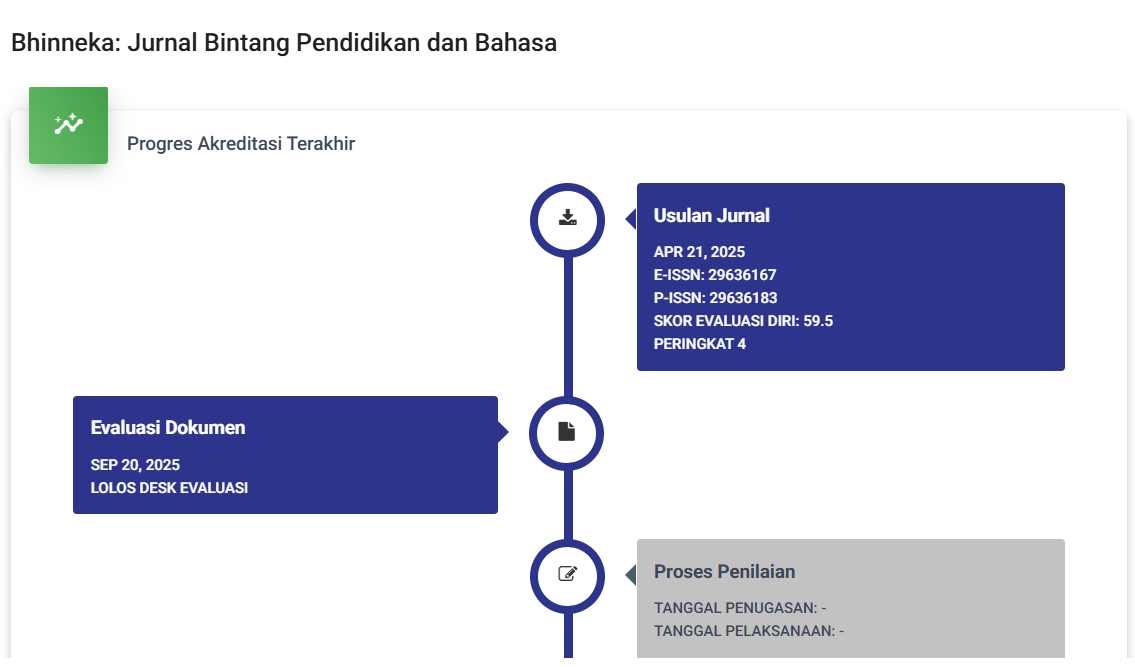Implementasi Kompetensi Kewirausahaan Kepala Sekolah dalam Upaya Meningkatkan Kesejahteraan Guru di MI Ma’arif NU Hidayatul Mubtadiin Padangasri Jatirejo Mojokerto
DOI:
https://doi.org/10.59024/bhinneka.v1i4.389Keywords:
Entrepreneurial Competence, School Principal, Teacher WelfareAbstract
This study aims to determine the implementation of entrepreneurial competence of school principals in an effort to improve teacher welfare at MI Ma'arif Nu Hidayatul Mubtadiin Padangasri Jatirejo Mojokerto with a research focus: How is the implementation of entrepreneurial competence of school principals in an effort to improve teacher welfare, what are the supporting and inhibiting factors of head entrepreneurial competence schools in improving the welfare of teachers MI Ma'arif NU Hidayatul Mubtadiin Padangasri Jatirejo Mojokerto The method used is a qualitative approach with a case study approach. Data collection techniques are used by observation, interviews and documentation studies. Data analysis techniques are made by data reduction, data display and conclusion (verification) and data validity. The results of this study indicate that: (1) indicate that the implementation of entrepreneurial competence of school principals is reflected in various innovative programs, such as the English-based Billingual Program, Student Shuttle Car, and Morning Prayer (TPQ). Commitment to work hard, have motivation, the principal also pays attention to the welfare of teachers with various forms of support, such as payment of salaries according to certification standard salary, THR, health benefits, allocation of BOS funds, and Family Gathering events. (2) Supporting factors include the experience of school principals in entrepreneurship, innovative programs such as the Billingual Program, Morning Prayer (TPQ) and student pick-ups, as well as transparency with all stakeholders. Inhibiting factors include financial constraints and parental constraints. Limited funds affect the implementation of innovative programs. whereas parental constraints such as limited time and understanding of the program may affect their participation
References
Barnawi & Mohammad Arifin. (t.t.). Schoolpreneurship: Membangkitkan Jiwa dan Sikap Kewirausahaan Siswa. Yogyakarta: Ar Ruzz Media.
Douglas J. Fiore. (2013). Introduction To Educational Administration Standards, Theries & Practice (SecondEdition. New York: Routledge.
E Mulyasa. (2008). Mebjadi Guru Profesional. Bandung: Alfabeta.
Ismail Nurdin & Sri Hartati. (2019). Metodologi Penelitian Sosial. Surabaya: Media Sahabat Cendekia.
Johar Permana & Darma Kesuma. (2011). Kewirausahaan dalam Pendidikan. Bandung: Alfabeta.
Joyce Huth Munro. (2008). Educational Leadership. New York: McGraw-Hill.
Lailatul Muqoyyaroh. (2018). Pengaruh Reward terhadap Kepuasan Kerja Karyawan PDAM Magetan. EQUILIBRIUM : Jurnal Ilmiah Ekonomi dan Pembelajarannya, 6(1), 95. https://doi.org/10.25273/equilibrium.v6i1.2190
Mansir, F. (2020). Kesejahteraan Dan Kualitas Guru Sebagai Ujung Tombak Pendidikan Nasional Era Digital. Jurnal IKA PGSD (Ikatan Alumni PGSD) UNARS, 8(2), 293. https://doi.org/10.36841/pgsdunars.v8i2.829
Mulyasa. (2011). Manajemen Berbasis Sekolah, Konsep, strategi dan Implementasi. Bandung: PT Remaja Rosdakarya.
Mulyasa, E. (2013). Menjadi Kepala Sekolah Profesional. Bandung: Remaja Rosdakarya.
Murip Yahya. (2013). Profesi Tenaga Kependidikan. Bandung: CV Pustaka Setia.
Prim Masrokan mutohar. (2013). Manajemen Mutu Sekolah Strategi Peningkatan Mutu dan Daya Saing Lembaga Pendidikan Islam. Yogyakarta: Ar-Ruzz Media.
Riska Oktafiana, Fathiyani, & Musdalifa. (2020). Kebijakan Kesejahteraan Guru Terhadap PeningkatanKualitas Pendidikan. Jurnal Mappesona, 3(3).
Sudadi. (2023). Profesionalisme Kepala Sekolah Dalam Memotivasi Kinerja Guru. Makasar: Mitra Ilmu.
Sugiyono. (2016). Metode Penelitian Manajemen. Bandung: Alfabeta.
Suyanto & Abbas. (2001). Wajah dan Dinamika Pendidikan Anak Bangsa. Yogyakarta: Adicita Karya Nusa.
Wahjosumidjo. (2007). Kepemimpinan Kepala Sekolah. Jakarta: Rajawali Pers.








